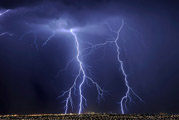 December 5, 2012
December 5, 2012 The Artist Compensation Storm
 As sure as dark clouds gather in hurricane season, a storm is brewing around artist compensation. Art and technology are at odds. However, it wasn’t always that way.
As sure as dark clouds gather in hurricane season, a storm is brewing around artist compensation. Art and technology are at odds. However, it wasn’t always that way.
From the advent of cassette multitracks in the ’80s, to the arrival of digital multitracks in the ’90s, to the maturation of digital audio workstations in the ’00s, affordable, cutting-edge technology enabled recording artists to seize the means of production. The rise of the internet enabled them to marshal the means of distribution. Without those home studios, without a free internet, artists would still be trying to catch the ear of some well-connected impresario who could foot the bill for commercial studio time and old-media publicity. It’s a plain fact: thanks to technology, producing and distributing music is a lot easier than it used to be. And artists have reaped the benefits.
Yet, as an artist, you sense that something is wrong.
Like an impending thunderstorm, you feel it coming. The wind kicks up, the temperature drops, the dogs begin to bark. Something is about to happen, and it might just take a gutter off your house.
Art and technology are about to collide.
Wait, Isn’t “Fairness” a Good Thing?
 The latest rumble arrives in the form of the proposed Internet Radio Fairness Act (IRFA). Led by internet-radio giant Pandora, proponents of the bill want to reduce the compulsory rate at which internet radio broadcasters pay royalties to artists. Supporters are seeking to cap royalties at a level they say supports the growth of internet radio. The “fairness” of that is debatable, but one thing is clear: if the Act becomes law, artists will be paid less, maybe a lot less, than they are now.
The latest rumble arrives in the form of the proposed Internet Radio Fairness Act (IRFA). Led by internet-radio giant Pandora, proponents of the bill want to reduce the compulsory rate at which internet radio broadcasters pay royalties to artists. Supporters are seeking to cap royalties at a level they say supports the growth of internet radio. The “fairness” of that is debatable, but one thing is clear: if the Act becomes law, artists will be paid less, maybe a lot less, than they are now.
That is, a big chunk of the money now marked for artist royalties will be used to subsidize the internet radio business.
There isn’t really a nice way to say that unless your goal is obfuscation. As unpleasant as it sounds, with the major labels in decline, the tech industry is poised and primed to raid the artist-royalty coffers.
As Cracker and Camper Van Beethoven frontman David Lowery put it recently, “Meet the new boss — worse than the old boss.”
Open the umbrella.
Who Determines Artist Compensation?
In everyday commerce, the seller sets a price the buyer can accept or reject. This practice is commonly known as “willing buyer/willing seller.” Yet artists often find their work being made available digitally without their consent, or being sold at a rate set by others.
Pandora is seeking to prevent artists from setting a price for internet radio licensing. IRFA would make fundamental changes to the Copyright Royalty Board, and make it virtually impossible for artists to challenge new, lower compulsory rates for internet radio play.
Hear that clap of thunder?
In no likely scenario is the internet radio industry going to sacrifice its profits for the well-being of artists. It is going to pursue its own interests as a content distributor, and do everything in its power, naturally, to drive down the price it pays for content.
When It Rains, It Pours
Sure, many artists still see the tech sector as an ally. It’s fun to record songs in GarageBand on your iPad. It’s fun to listen to Pandora, a great platform that serves not only listeners but artists, too. Technological innovation has delivered a new level of freedom to artists, helping them to create more efficiently and to reach more people with their work than ever before.
So what’s the problem, exactly?
The problem is that these brewing storm fronts each have their own momentum. And they have just met at the same point in the sky: artist royalties.
The good news, and don’t let Kim Dotcom tell you differently, is that you own the content you create. Without it, all else — including internet radio — fails.
And that is a flood the tech sector does not want to see.
What should artists do to protect their royalties? Leave it in the comments below.
—
Mark Doyon is principal and creative director of Wampus Multimedia, a record label, publishing imprint, and creative branding agency based in the Washington, D.C. area.
 radio,
radio,  streaming | tagged
streaming | tagged  compensation,
compensation,  internet radio,
internet radio,  pandora,
pandora,  royalties
royalties 





Reader Comments